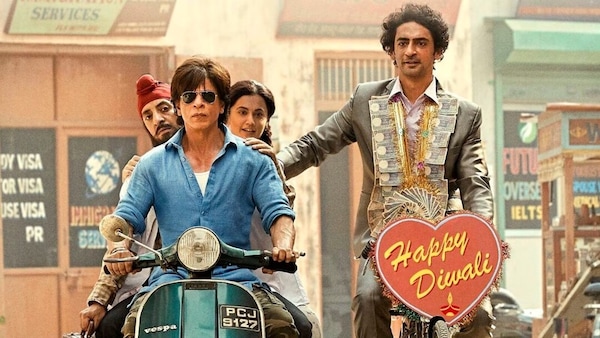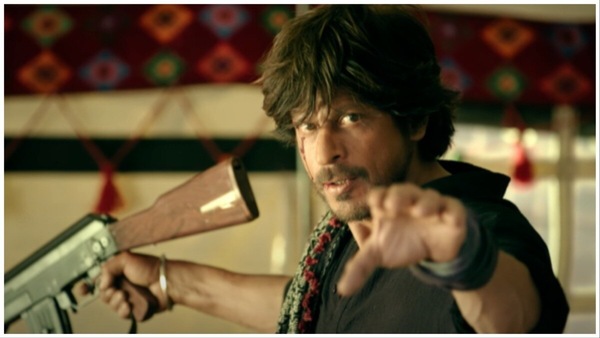Dunki: An Immensely Watchable Vicky Kaushal Is Sole Bright Spot In A Boring, Dated Film
This is #CriticalMargin, where Ishita Sengupta gets contemplative over new Hindi films and shows. Here: Dunki.

Last Updated: 08.04 PM, Dec 21, 2023
RAJKUMAR HIRANI’S Dunki is Shah Rukh Khan’s third release of the year. Prior to this he starred in Siddharth Anand’s Pathaan and Atlee’s Jawan. This frequency is an anomaly given that the actor was on a self-induced sabbatical till more recently. Besides, it had been a while since he featured on the screen so consistently. But there was no sense of fatigue because his last two portrayals were a departure from his previous iterations. At the start of 2023, the actor, prone to doing love stories, rebirthed as an action star. The allure resided in the mechanics of the transformation: that he was falling to rise again and rising to fall back on screen mimicked the way he dealt with the personal upheavals in his life that played out in public spaces. The ageing superstar reclaimed his superstardom by showing his bruises; life and mythology blended into one and crafted a fulfilling tale. Dunki disrupts this arc.
The film can be surmised as an unappetising cocktail of Khan’s familiar moves and Hirani’s known tricks. Thus, the actor is introduced in a scene where he is standing in a field and wearing a sweatshirt that feels deceptively similar to the one he had worn in his introductory scene of Aditya’s Chopra’s Dilwale Dulhania Le Jayenge. Almost poetically, Chopra’s outing was released in 1995 and the majority of Hirani’s film unfolds in that year. The man on screen has aged since but he is still running like his life depends on it. When his character, Hardayal Singh Dhillon (Hardy) falls in love, he breaks into a coy dance reminiscent of Haule Haule from Chopra’s Rab Ne Bana Di Jodi (2008). When Hardy is drunk and makes a show on the road, it is difficult not to be reminded of the many times Khan used inebriation as an effective comic tool in his films (think: Om Shanti Om).
Ditto for Hirani. The film is based on the theme of migration to First World countries, and centres on four friends in Punjab who intend to illegally migrate to England after being denied a visa. It is not that they didn’t try. Manu (a spirited Taapsee Pannu), Buggu (Vikram Kochhar), Balli (Anil Grover) and Sukhi (Vicky Kaushal) want to leave their native land, Laltu, to make a living abroad. But English is a problem. They enrol in a language proficiency course to secure a student visa. Helping them is Geetu Gulati (Boman Irani), the teacher. Dunki, at its core, is about the necessity and the impossibility of homecoming.
Such an emotionally hefty premise where humour opens up as the most accessible tool to make a point fits right up Hirani’s alley. Take any of his past films as samples — in PK he made a commentary on religion with a lightness of touch; he did the same in 3 Idiots as he fixed his gaze on the blind race to success — and his proficiency shows up. That a language barrier is written into the narrative provides a ready space for humour.

The results are sporadically organic. When Sukhi is asked in the interview if he is tense, he loosens his shoulders and responds with another question, “Past or present?” When Hardy is told to speak about his family for two minutes, he shoots off with his limited vocabulary, making everyone dead. Similarly, the fact that there are people waiting to be rescued preempts the presence of a hero who has no vulnerable bone in his body. Hardy is a former army officer who arrives at Laltu from Pathankot and never leaves. He makes it his life’s mission to help Manu, Buggu and others reach London.
But Dunki, with its laboured storytelling, long humourless stretches of action, and simplistic approach, culminates as an uninspiring collaboration between an actor and a director, both of whom prove to be woefully dated. During its runtime, the film underlines the rusty chops of a director who refused to match strides with time. Sweeping broad strokes are synonymous with Hirani’s repute as a filmmaker but there was craft in the way he deployed them. None of it is present in Dunki, which unfolds as a rehash of his previous films without an update. The jokes are caged in time, so is the way emotional scenes are orchestrated. When Buggu lands in England but is still confused about where he is, he looks at a Black man in the distance and promptly says that maybe they are in Africa. When they are hauled up in Iran, the officers are characterised in sleazy excess (the moment brings to mind Bobby Deol’s introduction scene in Animal — unsurprisingly music and hand gestures play a role). When a subservient Indian man tells his white employer that he is done for the day, the latter channels his inner Lagaan and remarks, “you bloody dishonest immigrant”.
In 2023 when storytelling has become more playful and inventive, these moments stick out as examples of lesser work. For much of Dunki, the theme and the tone appear to be at odds with each other. The funny thing is this statement might have been true for every Hirani film and the fact that he resolved the tension contributed to their memorability. In his latest work (written by Abhijat Joshi, Kanika Dhillon and Hirani), they collide and result in such lacklustre storytelling that incongruent details, which in a more immersive set-up one might have overlooked, stick out. For instance, the film unravels in flashback when Manu, Buggu and Hardy are young. After 25 years, their parents are not just alive but look almost the same age as them. It also makes little sense why Hardy would leave everything behind to help them. He is written as a strangely intrusive character who fights everyone’s battles as if to look for his own purpose in them. This line of thought would have worked if we were given an inkling of his past life. We get nothing except that he is a soldier. Oddly we get no proof of this and the detail is used as a pickup line, which on second thoughts I am inclined to believe. Much later, when Manu asks him why he is doing what he was doing, Hardy looks at her and says it is all for her.
Two decades ago this would have floated. Much like the way it did in Veer-Zaara when Khan’s character convinced us that he fell in love with a woman on the first meeting and fell so hard that he never recovered. But today the truth is that he is a formidable star and a restricted actor. His mannerisms are imprisoned by affectation. The way he cries, with puckered throbbing lips, has been a nagging problem. In Dunki, where he spends the entire second half crying, it becomes increasingly difficult to watch his lips swell. But in some moments he shines. There is a scene when Hardy goes to London and reckons with the distance that exists between truth and reality. He pulls up Balli who was the first among them to migrate and sent pictures to assert the false narrative. It is a touching instance for the way it offers legacy up for inspection — here is an actor questioning the NRI dream he had single-handedly designed with his films.
But the predominant problem plaguing a film like Dunki is how dishonest it feels. In its pursuit to tell an emotional story about homecoming, it refuses to probe into why people leave their homes to begin with. Hirani is so concerned in telling a patriotic story that he turns a blind eye to what generally are considered primary reasons for migration — unemployment and poverty. Instead, he makes jokes out of them. One man decides to leave because his mother works as a security personnel and when she wears pants, other men stare at her. Another reasons that his mother does not get a break from tailoring other people’s clothes. It is only Manu who comes closest to being convincing. Her brother has died and they have lost their claim to their ancestral home. She wants to go abroad and earn money to reinstate her father’s lost pride. One can argue that their rationales seem facile because there is never a good enough reason to leave one’s own country. But the truth is people do leave and Dunki, stacked to the brim with tomfoolery, provides not one good reason for it.
Standing in this crowd of silliness is Vicky Kaushal, an actor so watchable that he would demand attention even while reading something off a piece of paper. As Sukhi, a man who lost his love to an abusive NRI man and is gripped with desperation to go to London just for one day to save her, Kaushal is feral and anguished. His desperation is so raw that he appears to be in his own film. His vacant eyes and slouched shoulders outline the difference between performativity and conviction, bringing to mind the Hirani films of yore. The ones that convinced us that a gangster can be a devotee of Mahatma Gandhi, an alien can fall in love, and a man can hide his identity for years from his friends. These are as improbable as the prospect of a man wanting to travel thousands of miles just for one day. But this time around, Kaushal did what Hirani failed to do: made us believe in the story.
